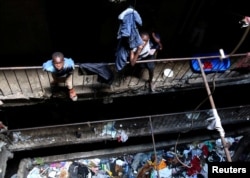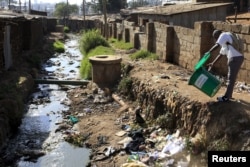According to the United Nations, uncollected garbage is a growing problem in cities around the globe, especially in areas with fast-rising populations. But there are solutions, as a youth group in Kenya’s capital is demonstrating.
“My name is Isaac Mutisia. I am 35 years old, and I am the co-founder of the Mathare Environmental Conservation Youth Group.”
We’re in the Mathare slum of Nairobi. Six-story high brick apartment buildings are around us. Ladies are selling groceries, and men are selling plastics.
Isaac Mutisia and his colleagues enter a building and climb the narrow stairs. They come out with a big dustbin full of garbage emitting an obnoxious stench.
Some 200,000 people are believed to live in Mathare, in an area of just 2 square kilometers. The slum is not only congested with people, but also with their garbage.
According to the United Nations, one city dweller produces 1 kilogram of garbage per day. For Mathare, it means that every day 200,000 kilograms of trash finds its way into a public space.
While taking a break from carrying garbage cans, Mutisia says that collecting waste is a dire necessity.
“When you have a lot of people in one area and there is no proper way of handling waste, you find that everyone dumps waste everywhere,” he said.
Mutisia says the waste was piling up on street corners and illegal dumping sites. Doctors warn about the health effects of garbage, especially for children.
Doris Shiundi is a physician in a local clinic. In the next room a nurse is giving a sick baby a checkup.
“When you have a lot of garbage on the street like here in Mathare, most of the times we see patients who come here with diarrhea, sometimes cholera. Others come in with food poisoning because they eat on the street,” she said.
This situation led Mutisia to do something to clean up the garbage, and at the same time meet another challenge.
“We saw the importance of making our community clean and also creating employment among ourselves because there was a challenge of unemployment,” he said.
Mutisia now has 100 youths collecting waste in the area, making money from households that pay to have their trash hauled away.
Once collected, the waste is brought to a legal dumping site.
The youths’ effort has caught the attention of local government officials, like Thomas Arimu
“We encourage the youths to copy what Kaka is doing to the neighboring community so that it becomes healthy,” he said.
Mutisia, meanwhile, is on the way to his next mission, visiting the U.N.-Habitat Assembly in Nairobi to talk about Mathare’s public spaces. His dream is to make the area as clean and green as the United Nations compound in Nairobi.







